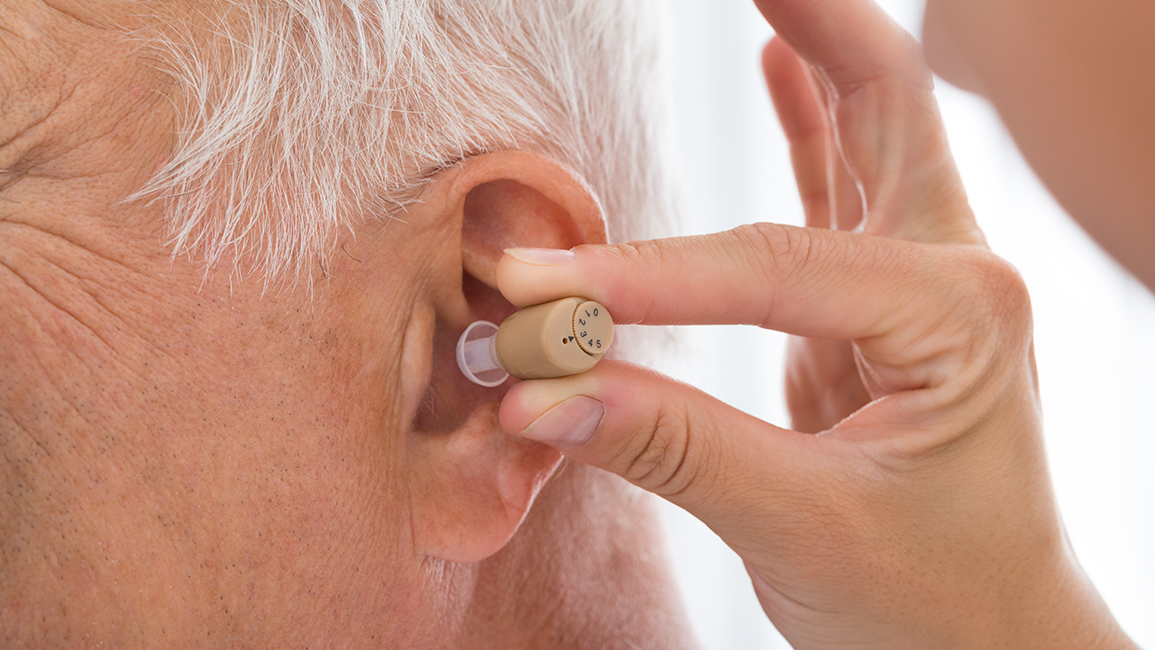Experiencing hearing problem? "Hearing aids can help."
Center : Ears Throat Nose Center

The mechanism of hearing is caused by the vibrations of the object. The properties that cause different sounds include frequencies (cycles / second or Hz) and loudness (decibel). When the sound travels through the air, the molecules reach the auricle. The auricle acts as a protection and gather the sound into the external auditory canal. The sound reaches the eardrum causing it to vibrate. The vibrations will be transmitted to 3 ear bones; malleus, incus and stapes which attach to the inner ear. The beginning of the hearing sensory is cochlea. It is hollow, spiral-shaped bone with the fluid-filled auditory sensory cells called hair cells. When the stapes moves causing the fluid to vibrate and the hair cells to convert vibrations into neural messages. These messages are then passed to the auditory nerve and carried up to the brain for interpreting. The frequency of the sound that human ear can hear are from 20 Hz to 20,000 Hz. However, the sound frequency range that is very important to everyday life is 500-2,000 Hz. The ear is capable and tolerant in hearing of sound within the limited range. If the sound is too soft, it will not be heard, but if it is too loud, it will damage the ears or cause ear pain. The loudness that is harmful to the ear is exceeding 85 dB.
Caution and prevention of hearing problems
- If there are abnormalities occur with the ear such as pain and itching in the ear, consult a doctor.
- Should not pick or spin the ears.
- Be careful of using drugs or various chemicals as they can be toxic to the auditory sensory.
- Avoid loud noise and be careful of impacting on the head
- Vaccination to prevent disease such as mumps, measles and rubella, which are in one vaccine, and encephalitis
Hearing aids
They are small amplifiers for people who have difficulty in hearing. They consist of various electronic devices such as microphones, speakers, and amplifiers. Nowadays there are many types and the quality has been improved. There are many types of hearing aids, such as analog and digital. If it is of good quality, it must be able to adjust by a computer, the sound can be adjusted more finely and can remove the surrounding sound automatically.
Indications of using hearing aids
The use of hearing aids is beneficial for individual patient. This should be under otolaryngologist supervision because the causes of loss of hearing are various from patients to patients. Some cases can be treated by medication or surgery. It may not be necessary to use hearing aid. The benefits of hearing aids are as followed:
- Patients with loss of hearing that cannot be treated by medication or surgery
- Hearing loss affects communication such as hearing the sound but don't understand the meaning.
- Hearing loss affects language and speech development in children.
- Patients loss of hearing from diseases which may benefit from surgery. But there are surgical contraindications such as heart disease with monaural.
The benefits of using hearing aids
- Improved listening ability. Able to interact and convey meaning by listening and speaking. Able to carry out activities in daily life normally.
- Patients with hearing loss and having tinnitus in the ears, after wearing a hearing aid, hearing will improved. Tinnitus in the ears tends to decrease or disappear.
- Wearing a hearing aid will help to maintain the function of the ear for those with prolonged hearing loss.
- If wearing hearing aids is unable to communicate well, a cochlear implant can be used. However, the price is quite high and must at the doctor's discretion.
Cochlear Implant
Cochlear Implant is a small, complex electronic device that bypasses damaged portions of the ear to deliver sound signals to stimuli hair cell in cochlear in the inner ear. The cochlear implant consists of 2 parts: an external part call
Sound Processing Unit which pick up sounds from the microphone and convert them into electric impulses. Then pass it to the internal part call Internal Receiving Unit, which fit behind the ear by sending the signal to stimuli the electrode in the cochlear.
Hearing to the brain
Cochlear implant surgery is the latest technology that allow hearing loss patients in severe case or deaf can hear again.
The Right person
- Children with severe congenital hearing loss. If they are having surgery before 2 years old, it will work very well. They can have development similar to normal children.
- Adults with severe hearing loss and ineffective using of hearing aids are found that cochlear implants will help in communication, emotional and social aspects of the patient.
- People with hearing impairment that are over 90 decibels who can benefit from hearing aids but need to use other hearing tests to consider the suitability for surgery.
Surgical procedure
- Must have a detail hearing examination
- Inspect the functioning of the middle ear
- Check the function of the inner ear nerve cells
- Check brain stem auditory capacity
- Must pass CT scan of the inner ear, blood test and other physical examination to determine the suitability for the surgery
- Should pass psychological examination to be evaluated by a psychiatrist or psychologist to see the level of intelligence emotional and social disorders.
Determining whether a person deserves surgery implantation: the cochlear implant is under the diagnosis of ENT doctor
Online Consultation
Free of Charge
Article of Ears Throat Nose Center




_614140049.jpg)
